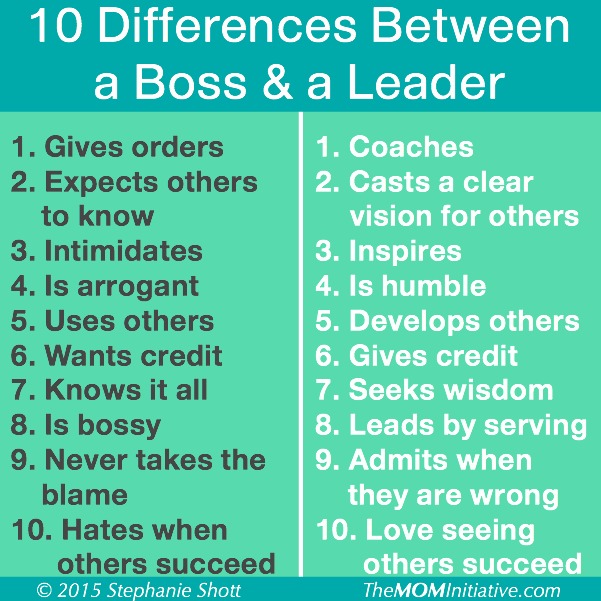Leadership can be lonely, hard, frustrating and messy. But it also can be amazingly fulfilling, beautiful and significant. Ultimately, a group is only as strong, as driven, as faithful and as fervent as its leader.
It’s a ripple-effect of sorts that can make a ministry soar or send it plummeting to the ground.
Leadership training is a huge part of The MOM Initiative because we know that, as goes the leader, so goes the ministry.
So..today, I hope to equip you with five things that can help you in your journey as a leader and becoming all God created you to be and five things we shouldn’t do.
5 Things Every Ministry Leader Should Do
1. BE HUMBLE – Effective leaders are innately and intentionally humble
Humility is not only foundational to effective leadership, it is also one of the most attractive character traits you and I can have. Effective leaders are humble by nature but also make the choice to walk in humility… choosing to put others first and submitting to authority well.
Humility functions in a lot of ways in a leader’s life:
1. It prevents pride – Since pride goes before a fall and leaders who fall tend to fall hard and cause a lot of others to fall with them, HUMILITY will help prevent the pride that causes leaders to make things all about themselves and the fall that accompanies the loss of focus and the elevation of themselves.
2. It helps leaders have a servant’s heart and be servant leaders who don’t point fingers and expect people to jump, but lead by example. The kind of leaders who aren’t afraid to get their hands dirty or break a sweat.
Jesus calls us to be servant leaders and it is the character of humility that lays the foundation for that in a leader’s life.
3. Humility helps leaders know and understand their own limitations and makes it easy for them to surround themselves with those who are good at what they are not.
4. Humility gives leaders the character to admit when they are wrong and to ask for help.
2. BE RESPECTFUL AND APPROACHABLE – Effective leaders respect others and make themselves available to others
Let’s face it, people aren’t drawn to arrogant people who are disrespectful of others. It’s hard to lead those you don’t respect and it’s hard for those you don’t respect to follow you.
Leaders who respect others are also leaders who are approachable. They listen. They consider. They evaluate if what others are saying to them is valid, helpful, or important. In conversations they are present when they are present.
If you’re going to be an effective leader, you have to respect others. People won’t follow those who they feel don’t respect them. And people won’t respect you if you act as if you are different from or better than they are.
Effective leaders see themselves as PART OF the team, not BETTER THAN or DIFFERENT FROM it.
Respect means you treasure each person regardless of their socio-economic status, their color, their culture, their power, their position, or their gender. You respect that they were uniquely created by God and for God and you see the potential in others – and respect where they are in the journey.
Eleanor Roosevelt once said, “To handle yourself, use your head; to handle others, use your heart.”
3. VISION BIG & MOBILIZE OTHERS – Effective leaders are visionaries and mobilizers
Good leaders vision big, organize well, and then… not only cast their vision, but they also keep their vision in front of others, and ultimately inspire others to get on board.
We all have dreams. If truth be told, each of us have dreamed of doing something much bigger than us and beyond our ability to accomplish it alone.
But dreaming big doesn’t make you a leader. Organizing that dream, casting a vision for that dream and then inspiring others to join you in the journey and to see their place in that dream… now THAT makes you a leader.
4. EMPOWER OTHERS – Effective leaders help others fulfill their God-given destinies
John Maxwell rightly said, “Leaders become great, not because of their power, but because of their ability to empower others.”
That’s why humility is so important! Good leaders aren’t threatened by the abilities or success of others. They help them achieve it. And they help them achieve success because of 2 reasons.
1. They know the success of those who are following their lead will ultimately help them succeed at making the vision come to pass.
2. They know that they are helping others become all God created them to be and there is joy in helping others step into their God-given destinies and discovering they can do and be more than they ever though possible.
And remember… people function best in the area of their giftedness. Help the women in your ministry thrive by discovering and honing their spiritual gifts and natural talents.
5. HAVE THE 4 D’s – Effective leaders are DISCIPLINED, DISCERNING, DETERMINED and DEPENDENT on God’s leading
Aristotle once said, “We are what we repeatedly do, excellence then is not an act, but a habit.”
DISCIPLINE: You have never heard of a good leader who wasn’t disciplined. They do what it takes to get the job done and they discipline themselves to make sure they can accomplish their goals.
DISCERNING: Leaders have to be discerning. Discerning enough to know what decisions need to be made, to know who is best at accomplishing certain necessary tasks, what will and won’t work, when to say YES and when to say NO, and what is necessary to inspire each person on their team in their own unique way.
DETERMINED: Effective leaders have to be determined to run their race well. Every dream, every ministry, every event comes with obstacles and if a leader isn’t determined, they will give up quickly and walk away.
DEPENDENT UPON GOD: Effective leaders understand they are leaders because God has placed them in that position and they are ultimately subject to His leadership. Knowing they don’t have all the answers and are dependent upon God will cause them to seek God’s face on behalf of every decision and on behalf of those he/she leads.
5 Things Every Ministry Leader Should NOT Do
1. CONSTANTLY TELL EVERYONE THEY ARE THE LEADER ~ Nothing wreaks of pride more than the need to constantly call yourself a leader and nothing makes others want to follow you less than pride
True leaders never have to point themselves out as leaders. Telling others the obvious only makes leaders look weak, needy and arrogant. If you are the leader, others know it. If you tell them you’re the leader, others will question it.
Just lead well and you’ll never have to point out that you are.
2. MICROMANAGE – No one works well under a leader who micromanages… especially in ministry.
There is a huge difference between being sure someone knows what they are to do and micromanaging them. If someone knows their job, let them do it. If someone is unsure of their job, cast the vision for their job, explain anything they don’t understand, invest in any training they may need, but never micromanage.
Micromanagers never attract good workers… they only run them off.
3. EXPECT PERFECTION – No one is perfect
People aren’t perfect. If there is a consistent problem with their productivity, then work with them on it. But remember, even great leaders have let things slip through the cracks, left things undone, messed things up, and didn’t meet their deadlines.
There are times when things may slip through the crack. Never expect someone to be perfect when you know yourself, that you too have allowed things to slip through the cracks.
Leaders aren’t perfect. They can’t expect those whom they lead to be perfect either.
4. UNDERMINE OR UNDER-APPRECIATE EFFECTIVE WORKERS – Good leaders recognize effective workers and spur them on
It happens all the time. Leaders undermine effective workers by criticizing them, by noticing what they might have missed and not recognizing what they do to make a difference for your ministry or organization, by assuming because other workers are lax that they have to be treated the same way as the lax workers do, and by under-appreciating the value of their work, the reality of what they do, and the dependability of their consistent work ethic.
When workers who are doing their jobs effectively are undermined by a leader who consistently belittles them or does not appreciate them, they will lose their most effective workers and blame it on the worker, not themselves.
Effective workers work best under effective leadership that does not undermine or under-appreciate the hard work and consistent contribution those workers make.
5. CREATE DIVISIVENESS OR DRAMA, BUY INTO IT OR REACT INAPPROPRIATELY TO EITHER
Drama causes divisiveness and divisiveness causes drama… and good leaders know it. So they never cause divisiveness by pitting one worker against another, by talking badly about one worker with another, by biting into the drama someone else creates, or by reacting inappropriately to either.
A divided team will be an ineffective team. Drama-makers should be taken at face value and if they continue to cause drama, they should be discipled as to what they are doing and why it is counterproductive and ungodly. And ultimately (as the song from Frozen goes) sometimes, you just gotta let ’em go!
Really! The Lord may have gifted them for something else and they may be miserable because they’re doing the wrong job.
A good leader will also not create unnecessary tasks, rules, or restrictions for effective workers because a drama queen (or king) has stirred the pot and made ministry unbearable. Inappropriate response to drama only feeds the drama and perpetuates it in a work environment.
A good leader should never be the cause of, or react inappropriately to, the divisiveness of drama. If they do, they are tearing down their own team-leading building blocks and then they will wonder why everything is falling apart.
So, there you have it! 10 important tips for effective, godly leaders. Five things we need to do. Five things we need NOT to do. Hope they help you in your leadership journey!
Here’s a FREE DOWNLOADABLE to encourage you in your ministry. Whenever you aren’t sure about the way you are leading, ask yourself, “Am I being a boss or a leader?”
WHAT STRUGGLES DO YOU DEAL WITH AS A WOMEN’S MINISTRY LEADER? WHAT WOULD YOU ADD TO HELP OTHER MINISTRY LEADERS? WE’D LOVE TO HEAR FROM YOU!
WE ARE ALSO AVAILABLE TO HELP YOU WITH LEADERSHIP TRAINING. FOR MORE INFORMATION, CONTACT INFO@THEMOMINITIATIVE.COM.
- Ch…ch…ch…CHANGES Are Coming in 2017 for TMI - December 27, 2016
- What New Thing Are You Ready to See God Do in Your Life in 2017? - December 26, 2016
- Heaviness and Newness - December 23, 2016




